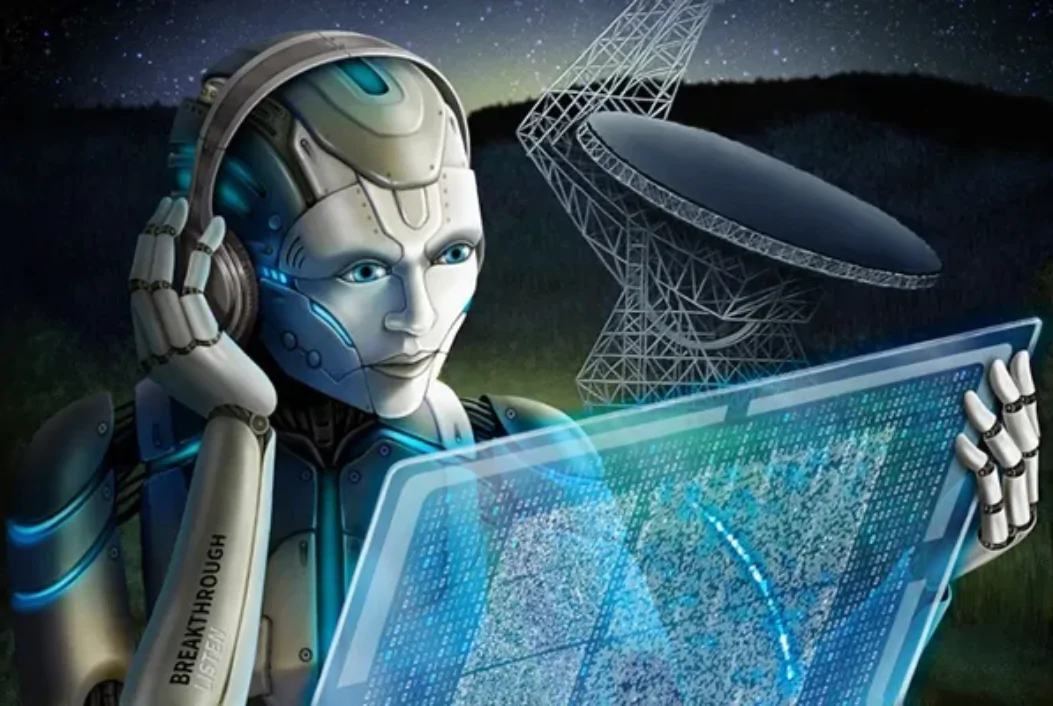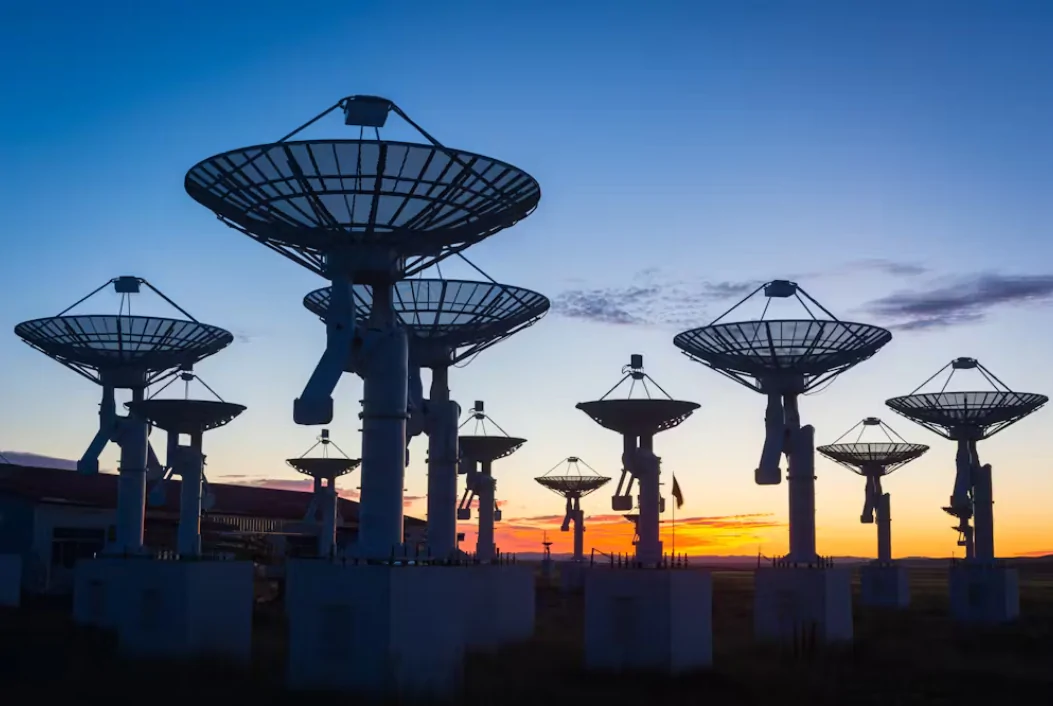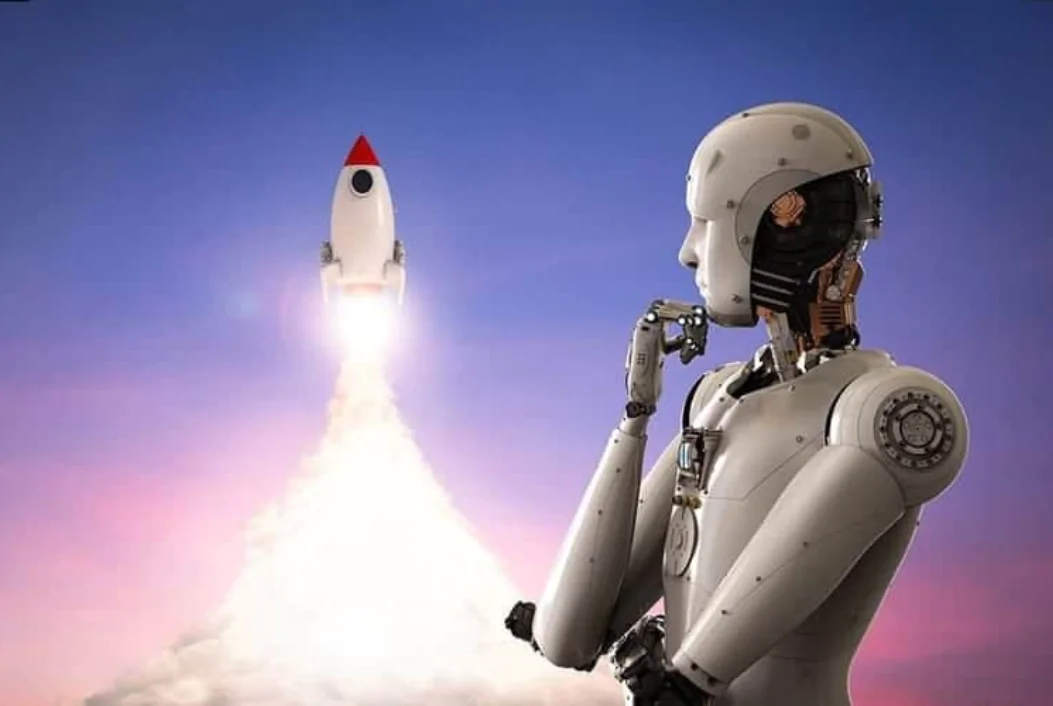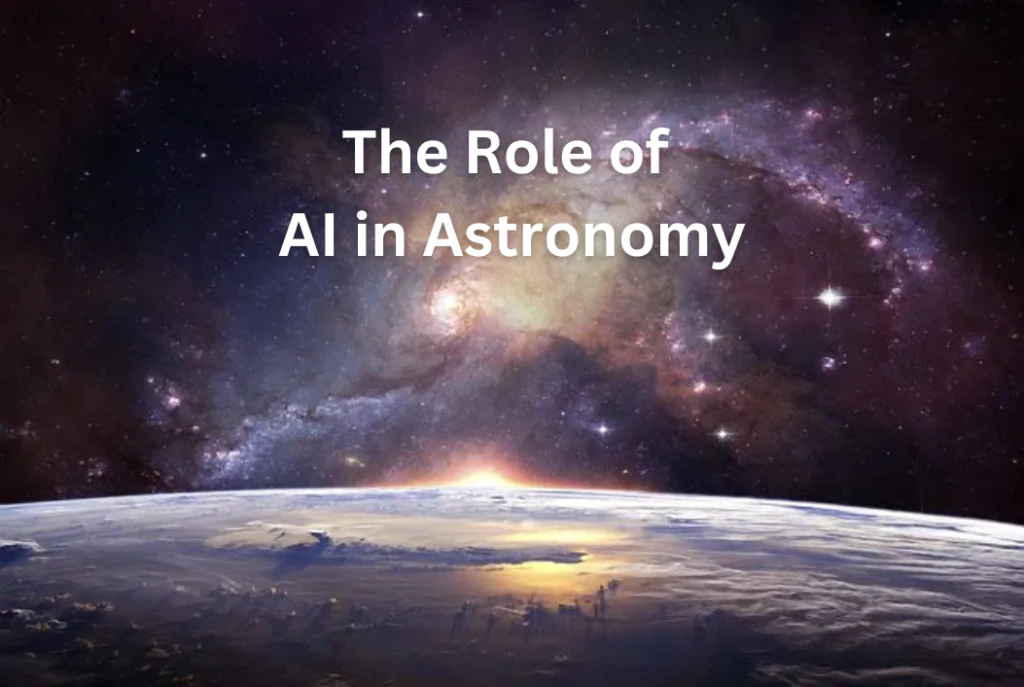Introduction of AI in Astronomy
In the vast expanse of the universe, the quest to understand its mysteries has driven humans to innovate and explore. Over the past few decades, the advent of Artificial Intelligence (AI) has significantly enhanced our capabilities in this quest. AI is revolutionizing astronomy by providing powerful tools for data analysis, improving detection capabilities, and enabling new discoveries. In this blog, we’ll explore the multifaceted contributions of AI in astronomy and how it is transforming our understanding of the cosmos.
History of AI in Astronomy

Artificial intelligence (AI) techniques were first applied to astronomy in the 1980s, particularly in the area of artificial neural networks (ANNs). Afterwards, in the 1990s and 2000s, ANN were employed in astronomical surveys for object detection, star-galaxy separation, and galaxy morphology classification. Convolutional Neural Networks (CNNs) have been used since 2010 to simulate complex astrophysical phenomena and identify distant galaxies by analyzing data from space telescopes.
Learn more about AI in Astronomy.
Role of AI in Astronomy
Massive volumes of data are produced by astronomy’s telescopes, satellites, and other instruments. Conversely, AI algorithms are able to analyze this data quickly and effectively, finding patterns in it. Artificial Intelligence (AI) has the potential to uncover new ideas and theories about how the universe functions by spotting patterns and relationships in data that humans might have missed.
Large amounts of astronomical data can be analyzed more quickly and effectively by AI algorithms than by humans. We can categories objects and find patterns with the aid of these algorithms. Deep learning methods can improve the resolution and quality of astronomical images. Predictive models of astronomical data are created using AI. These are employed in forecasting future occurrences, asteroidal motion, star behavior, and galaxy evolution.
Handling the Data Deluge
Modern telescopes and observatories generate colossal amounts of data. For instance, the Large Synoptic Survey Telescope (LSST) is expected to produce about 15 terabytes of data every night. Managing and analyzing such enormous datasets manually is impractical. This is where AI steps in.
AI algorithms, particularly those in the domain of machine learning (ML), are adept at handling large datasets. They can sift through vast amounts of information quickly, identifying patterns and anomalies that might be missed by human analysts. This capability is crucial in a field where new data is generated at an unprecedented rate.
Automated Classification of Celestial Objects
One of the significant contributions of AI in astronomy is the automated classification of celestial objects. Traditionally, classifying objects such as stars, galaxies, and quasars based on their spectral data and images required substantial human effort. AI systems, using sophisticated machine learning models, can perform these classifications rapidly and accurately.
For example, convolutional neural networks (CNNs) are used to analyze images from telescopes, distinguishing between different types of galaxies. This automation not only speeds up the process but also allows astronomers to focus on more complex analyses and interpretations.
Enhancing Image Processing
Astronomical image processing is another area where AI has made substantial strides. AI models can enhance images from telescopes, helping to identify and categorize objects more precisely. They can also reduce noise and correct distortions in the images, which is crucial for improving the quality of observational data.
AI techniques help in cleaning up images by removing artifacts and enhancing the visibility of faint objects. This improved image quality is vital for making accurate observations and discoveries.

Detecting Exoplanets
The search for exoplanets—planets outside our solar system—has been one of the most exciting areas in modern astronomy. AI has significantly contributed to this search, particularly through the analysis of data from missions like Kepler and TESS.
AI algorithms analyze the light curves of stars to detect the slight dimming caused by transiting exoplanets. Machine learning models can process this data more efficiently and accurately than traditional methods. Moreover, AI helps in distinguishing between genuine exoplanet signals and false positives caused by stellar activity or other phenomena.
Gravitational Wave Detection
Gravitational waves, ripples in spacetime caused by massive cosmic events, are a relatively new observational window into the universe. Detecting these waves requires sifting through vast amounts of data to identify the faint signals.
AI plays a critical role in this process. Machine learning models help identify and interpret the weak signals of gravitational waves, which might be buried in noise. They also assist in classifying the sources of these waves, providing insights into the nature of events like black hole mergers and neutron star collisions.
Advancing Astronomical Simulations
Astronomical simulations are essential for understanding the universe’s complex phenomena. AI is used to run and analyze simulations of cosmic events, such as galaxy formation and dark matter distribution. These simulations help scientists comprehend the underlying physical processes shaping the universe.
Machine learning models can also predict the evolution of celestial systems and the outcomes of cosmic events based on initial conditions and historical data. This predictive capability is invaluable for theoretical research and hypothesis testing.
Facilitating Astronomical Surveys and Discoveries
Automated astronomical surveys powered by AI are leading to new discoveries. AI systems can survey the sky continuously, identifying transient events like supernovae, gamma-ray bursts, and other phenomena that require rapid follow-up observations.
These systems have already led to the discovery of new celestial objects, including unknown asteroids, comets, and variable stars. By automating the survey process, AI ensures that no significant event goes unnoticed.
Enhancing Theoretical Research
AI is not only transforming observational astronomy but also enhancing theoretical research. Machine learning algorithms excel at recognizing complex patterns in data, which can lead to new theoretical insights and discoveries.
AI can test and validate theoretical models by comparing predicted data with observational data. This process helps refine our understanding of the universe’s laws and constants, driving progress in theoretical astrophysics.
Learn about 2000+ AI Tools for Free.
Contribution of AI in Astronomy
Artificial Intelligence (AI) has made significant contributions to the field of astronomy, enhancing our ability to explore, understand, and analyze the universe. Here are some key areas where AI has had a notable impact:
-
Data Analysis and Management:
- Handling Large Datasets: Modern telescopes and observatories generate vast amounts of data. AI algorithms, particularly machine learning (ML), are adept at managing and analyzing these large datasets efficiently. This includes identifying patterns and anomalies that might be missed by human analysis.
- Automated Classification: AI systems can classify celestial objects (like stars, galaxies, and quasars) based on their spectral data and images, speeding up processes that would take humans much longer.
-
Astronomical Image Processing:
- Image Recognition: AI models can process and enhance images from telescopes, helping to identify and categorize objects more accurately. For example, convolutional neural networks (CNNs) are used to distinguish between different types of galaxies.
- Noise Reduction: AI techniques help in cleaning up images by reducing noise and correcting distortions, which is crucial for improving the quality of the observational data.
-
Detection of Exoplanets:
- Transit Method Analysis: AI algorithms analyze data from missions like Kepler and TESS to detect the slight dimming of stars caused by transiting exoplanets. Machine learning models can process this data more quickly and accurately than traditional methods.
- Identifying False Positives: AI helps in distinguishing between genuine exoplanet signals and false positives caused by stellar activity or other phenomena.
-
Gravitational Wave Detection:
- Signal Identification: AI plays a critical role in detecting and interpreting the weak signals of gravitational waves, which are ripples in spacetime caused by massive cosmic events like merging black holes or neutron stars. Machine learning models help sift through the noise to find these signals.
- Event Classification: AI helps classify the sources of gravitational waves, providing insights into the nature of the events that caused them.
-
Astronomical Simulations:
- Cosmological Simulations: AI is used to run and analyze complex simulations of cosmic phenomena, such as galaxy formation and dark matter distribution. These simulations help scientists understand the underlying physical processes shaping the universe.
- Predictive Modeling: Machine learning models can predict the evolution of celestial systems and the outcomes of cosmic events based on initial conditions and historical data.
-
Astronomical Surveys and Discovery:
- Automated Surveys: AI automates the process of surveying the sky, identifying transient events like supernovae, gamma-ray bursts, and other phenomena that require rapid follow-up observations.
- New Discoveries: AI systems have led to the discovery of new celestial objects, including unknown asteroids, comets, and variable stars, by analyzing vast amounts of data from sky surveys.
-
Enhancing Theoretical Research:
- Hypothesis Testing: AI can be used to test and validate theoretical models by comparing predicted data with observational data. This helps in refining our understanding of the universe’s laws and constants.
- Pattern Recognition in Data: Machine learning algorithms excel at recognizing complex patterns in data, which can lead to new theoretical insights and discoveries.

Conclusion
Artificial Intelligence is undeniably revolutionizing astronomy. From managing and analyzing vast datasets to enhancing image processing, detecting exoplanets, and facilitating new discoveries, AI is at the forefront of modern astronomical research. Its contributions are helping astronomers to unlock the secrets of the universe, offering a deeper understanding of the cosmos. As AI technology continues to advance, its role in astronomy will undoubtedly grow, heralding an exciting era of discovery and exploration.
FAQ
Q1: How is AI used to manage large datasets in astronomy?
A1: AI, particularly machine learning algorithms, helps manage and analyze the vast amounts of data generated by modern telescopes and observatories. These algorithms can quickly sift through the data, identifying patterns and anomalies that might be missed by human analysts. This capability is crucial for processing the enormous datasets produced daily in astronomical research.
Q2: What role does AI play in the classification of celestial objects?
A2: AI systems, using machine learning models, automate the classification of celestial objects such as stars, galaxies, and quasars. For example, convolutional neural networks (CNNs) analyze telescope images to distinguish between different types of galaxies. This automation speeds up the classification process and improves accuracy.
Q3: How does AI enhance astronomical image processing?
A3: AI models enhance images from telescopes by reducing noise, correcting distortions, and improving visibility of faint objects. These enhancements lead to higher quality observational data, which is essential for accurate analysis and discoveries.
Q4: Can AI help in the detection of exoplanets?
A4: Yes, AI is crucial in detecting exoplanets by analyzing light curves from stars for the slight dimming caused by transiting planets. AI algorithms process this data more efficiently and accurately than traditional methods and help differentiate between genuine exoplanet signals and false positives.
Q5: What is the significance of AI in gravitational wave detection?
A5: AI helps identify and interpret the weak signals of gravitational waves, which are ripples in spacetime caused by massive cosmic events. Machine learning models sift through noise to find these signals and classify the sources, providing insights into events like black hole mergers and neutron star collisions.
Q6: How does AI contribute to astronomical simulations?
A6: AI is used to run and analyze complex simulations of cosmic phenomena, such as galaxy formation and dark matter distribution. These simulations help scientists understand the underlying physical processes of the universe. AI also predicts the evolution of celestial systems and the outcomes of cosmic events based on initial conditions and historical data.
Q7: What advancements has AI brought to astronomical surveys and discoveries?
A7: AI automates the process of surveying the sky, continuously identifying transient events like supernovae and gamma-ray bursts that require rapid follow-up observations. AI systems have also discovered new celestial objects, including unknown asteroids, comets, and variable stars, by analyzing data from sky surveys.
Q8: How does AI enhance theoretical research in astronomy?
A8: AI enhances theoretical research by recognizing complex patterns in data, leading to new insights and discoveries. Machine learning algorithms test and validate theoretical models by comparing predicted data with observational data, helping refine our understanding of the universe’s laws and constants.
Q9: What future advancements can we expect from AI in astronomy?
A9: As AI technology continues to advance, its role in astronomy will expand. Future advancements may include more sophisticated data analysis techniques, improved accuracy in detecting cosmic phenomena, enhanced simulations of complex astronomical events, and even more automated and precise sky surveys, leading to unprecedented discoveries and a deeper understanding of the cosmos.
Q10: How can someone get involved in the field of AI in astronomy?
A10: To get involved in AI in astronomy, one can pursue education and training in both fields. Degrees in computer science, data science, or astrophysics, with a focus on machine learning and data analysis, are beneficial. Additionally, participating in relevant research projects, internships, and collaborations with astronomical observatories or institutions can provide practical experience and opportunities to contribute to this exciting interdisciplinary field.



Pingback: AI in Space Exploration: Paving the Way for New Discoveries in 2024
I like this web blog it’s a master piece! Glad I discovered
this ohttps://69v.topn google.Raise your business